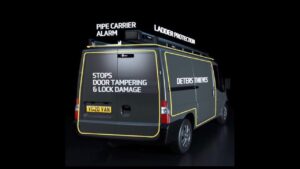

Motorhome alarm systems are a vital component in safeguarding recreational vehicles (RVs) against unauthorised access and theft. They serve as a formidable line of defense, ensuring that your mobile haven remains secure whether you are traversing the European countryside or resting at a campsite.
A motorhome is not just a vehicle; it’s a significant investment and a home away from home for many couples over 60 who cherish their travel across Europe. With motorhomes often containing valuables such as televisions, laptops, and personal items, they become an attractive target for thieves. Vanguardian highlights that the rate of motorhome thefts has escalated by 26% over the past three years, with a mere 7% recovery rate, which underscores the importance of a robust motorhome alarm system. Not only do these systems provide an audible alert when a breach occurs, but they also act as a deterrent, discouraging potential thieves from attempting a break-in. By investing in a quality motorhome alarm system, owners can enjoy peace of mind and protect their cherished possessions.
When considering motorhome security systems, there are two primary classifications of alarms recommended for motorhomes: Thatcham Category 1 and Thatcham Category 2-1. Thatcham Category 1 is recognised as the most secure option, integrating various features such as immobilisation, perimeter detection, and movement sensors.
| Alarm Category | Features |
|---|---|
| Thatcham Category 1 | Immobilisation, Perimeter detection, Movement sensors |
| Thatcham Category 2-1 | Upgrade from Category 2 with added alarm system |
Thatcham Category 1 alarms are comprehensive, combining an alarm with an immobilizer. By contrast, Thatcham Category 2-1 alarms represent an upgrade from Category 2, which is solely an immobilizer, by adding an alarm system to the existing setup. These alarm types are designed to meet strict standards, and having a Thatcham-approved alarm can notably reduce the likelihood of theft while potentially providing discounts on insurance premiums.
For those seeking further information on the range of available security options, exploring motorhome security systems and motorhome security alarms can provide valuable insights into making an informed choice.
It’s recommended to select a system with remote monitoring capabilities, allowing owners to stay connected with their RV’s security system even from afar. This feature can be particularly advantageous for those who spend extended periods away from their motorhome, providing an added level of reassurance. For a comprehensive overview of the various features offered by motorhome alarm systems, including GPS tracking and additional security measures, owners are encouraged to consult the section on motorhome tracking devices and motorhome theft prevention.
Motorhome alarm systems are an essential defense mechanism, providing a multi-layered approach to security. These systems not only deter potential thieves but also ensure that owners are promptly alerted in the case of any unauthorised entry or disturbance.
The primary function of a motorhome alarm system is to act as a deterrent against theft or unauthorised access. An effective system will feature a loud alarm to ward off intruders and alert nearby individuals to the situation. According to Cove, the presence of an alarm system can provide peace of mind by enhancing the security of the vehicle. Additionally, many systems come equipped with shock sensors and motion detectors, which can detect and respond to varying degrees of impact and movement.
Here’s a brief overview of common deterrents and alerts found in motorhome alarm systems:
For further information on the types of deterrents available, readers can explore motorhome security alarms.
Modern motorhome alarm systems often allow for remote monitoring and control, enabling owners to stay connected with their vehicle’s security system even when they are not in close proximity. This is typically accomplished via a smartphone application that can send real-time updates and alerts directly to the owner’s device. The RVLock Alarm system, for instance, can inform users about the status of doors and battery life, and send alerts to multiple users (TheRVGeeks).
The ability to monitor the motorhome remotely is not only convenient but also adds an extra layer of security, as owners can respond quickly to any potential threats. To explore systems with remote monitoring capabilities, check out motorhome security systems.
In the unfortunate event of theft, GPS tracking capabilities in an alarm system can be invaluable. These features allow owners to locate their motorhome in real-time, significantly enhancing the chances of recovery. GPS tracking functionalities are designed to pinpoint the exact location of the RV, making it easier for law enforcement to locate and retrieve the vehicle (iSmartHomeSecurity).
In addition to aiding in the recovery of a stolen motorhome, GPS tracking can also be useful for owners who wish to keep a record of their travels or monitor their vehicle’s location for any other reason. Motorhome owners interested in these features can find more information on motorhome tracking devices.
By incorporating these key features into a motorhome alarm system, owners can significantly bolster the security of their vehicle. From loud sirens and motion sensors to remote monitoring and GPS tracking, these systems offer a comprehensive approach to safeguarding one’s investment while enjoying the freedom of travel.
When it comes to motorhome security, installing an alarm system is a critical step in protecting your vehicle from theft and ensuring peace of mind during your travels. Choosing the right system and deciding on the installation method are both key aspects that require careful consideration.
Selecting the appropriate alarm system for your motorhome involves assessing various factors such as the types of sensors included, the alarm’s volume, and its compatibility with remote monitoring technologies. According to iSmartHomeSecurity, a comprehensive motorhome alarm system should include a siren, shock sensors, and motion detectors to provide an all-encompassing security solution.
For those seeking advanced features, systems that allow for remote monitoring through a smartphone app are highly recommended, enabling you to maintain a connection with your motorhome’s security even when you are away. Additionally, alarm systems like the RVLock, as recommended by TheRVGeeks, integrate enhanced protection features that can offer further reassurance.
It is also important to consider the classification of the alarm system. Thatcham Category 1 alarms are known for their robust security features, including immobilisation, perimeter detection, and movement sensors, making them a top choice for motorhome owners (Vanguardian). Here’s a quick comparison of the two main types of motorhome alarms:
| Alarm Type | Features | Security Level |
|---|---|---|
| Thatcham Category 1 | Immobilisation, Perimeter detection, Movement sensors | High |
| Thatcham Category 2-1 | Add-on alarm upgrade, Basic security features | Moderate |
Knowing the right system for your motorhome will depend on your specific needs and preferences. Explore a variety of motorhome security systems to find the best fit for your lifestyle and security requirements.
Choosing the right van alarm system is pivotal, and with Vanguardian’s innovative solution, the decision between professional installation and a DIY approach becomes clearer. Vanguardian stands out by ensuring its system is not only preemptively alerting owners at the slightest sign of tampering—acting as an immediate deterrent—but also by championing user-friendly installation. Unlike traditional systems that might require intricate setup procedures or professional assistance, Vanguardian prides itself on its easy DIY installation. This approach not only circumvents the potential for common pitfalls, such as false alarms, but also empowers van owners with a straightforward, effective security solution.
For those who appreciate simplicity and efficiency, Vanguardian’s system offers a seamless experience. By adhering to clear, concise instructions, owners can ensure their system is optimally positioned and fully operational, without the need for specialist intervention. This not only saves on installation costs but also enhances the understanding and confidence owners have in their van’s security measures. With Vanguardian, the balance between comprehensive protection and ease of use is perfectly struck, providing peace of mind and safeguarding against theft with minimal fuss.
| Installation Type | Pros | Cons |
|---|---|---|
| Professional | Expert fitting, Reduced risk of false alarms, Warranty and support | Additional cost |
| DIY | Potential cost savings, Personal control over installation | Risk of incorrect installation, No professional support |
Weigh the pros and cons of each installation method to determine what suits your skills and budget. Remember that the effectiveness of your motorhome alarm systems relies not only on the quality of the product but also on the quality of the installation.
While motorhome alarm systems are a vital component of your vehicle’s security, it’s essential to complement them with other measures to fortify your motorhome against theft and break-ins. Physical deterrents and safe storage practices are two key areas that can significantly enhance the overall security of your home on the road.
Physical deterrents serve as the first line of defence in protecting your motorhome. These deterrents not only make it more difficult for thieves to gain access but also make your motorhome a less appealing target. The following are some recommended physical security devices:
According to iSmartHomeSecurity, incorporating such physical deterrents can substantially enhance protection against theft. Alko Tech also emphasises that specialised security systems for motorhomes such as immobilisers, alongside mechanical locks, can significantly reduce the risk of theft.
Remember, utilising multiple layers of security provides the best protection. For more comprehensive information on physical security measures, visit our guide on motorhome theft prevention.
In addition to physical locks and deterrents, how and where you store valuables can play a crucial role in preventing theft. Here are some safe storage practices to consider:
It is also advisable to maintain a detailed inventory of your belongings, including serial numbers and photographs, to aid in recovery should a theft occur.
By integrating robust physical deterrents with smart storage practices and motorhome alarm systems, you significantly increase the security of your motorhome. For more insights on how to keep your motorhome secure, explore our motorhome security tips. Remember, the goal is to create multiple layers of security that work together to protect your mobile sanctuary and your peace of mind as you travel across Europe.
A key benefit of investing in motorhome alarm systems is the potential impact on insurance. For many motorhome owners, particularly couples over 60 who enjoy touring Europe, the peace of mind that comes with a secure vehicle is paramount. Beyond the immediate security advantages, there are also financial incentives in the form of insurance benefits to consider.
Installing a motorhome alarm system can lead to potential insurance discounts, as insurance companies often recognise the reduced risk associated with vehicles that are well-protected. Vanguardian reports that insurance providers may offer reduced premiums for motorhomes with approved security systems. These discounts can be significant, and they serve as a reward for the proactive steps taken by the owner to secure their vehicle.
It’s important for motorhome owners to consult with their insurance provider to understand the specific discounts available to them. Here is a hypothetical example of how premium discounts might look:
| Security Feature | Potential Discount |
|---|---|
| Approved Alarm System | up to 5% |
| Additional Tracking Device | up to 10% |
| Comprehensive Security Package | up to 15% |
These figures are illustrative and will vary based on the insurance provider and the level of security installed. Owners should explore the range of motorhome security systems, including alarms, cameras, window security, and tracking devices, to maximise potential discounts.
In some cases, insurance providers may have specific requirements for motorhome alarm systems in order to qualify for coverage or discounts. As the number of stolen motorhomes has risen by 26% in the past three years, with only 7% being recovered, insurers are becoming increasingly stringent with their requirements (Vanguardian).
Motorhome owners should be aware that insurers might request systems that meet certain standards or certifications. For instance, an alarm system with Thatcham Category 1 approval may be a prerequisite for coverage. It is essential for owners to verify these requirements before purchasing an alarm system to ensure it aligns with their insurance policy and maximises the likelihood of recovery in the event of a theft.
The importance of robust security measures cannot be overstated, both for the safety of the motorhome and its occupants, and for the financial benefits associated with insurance. Investing in high-quality motorhome theft prevention measures not only deters theft but also strengthens the owner’s position when negotiating insurance terms. For further guidance on keeping your motorhome secure, consider reading our motorhome security tips.
Maintaining the effectiveness of motorhome alarm systems is crucial for the protection of your vehicle. Regularly performed checks and updates are essential to keep the system functioning correctly and to ensure the safety of your motorhome.
To maintain your motorhome’s security, it is vital to conduct routine inspections of your alarm system. This includes testing all components such as batteries, sensors, and the actual alarm to ensure they are in proper working order.
Here is a checklist for regular maintenance:
Consult the user manual or the manufacturer’s customer support for guidance on how to perform these checks correctly. They can offer advice on common issues and how to resolve them.
False alarms can be a nuisance and may compromise the trust in your system’s reliability. Understanding how to troubleshoot and rectify false alarms is important to maintain the integrity of your security measures. Frequent false alarms may necessitate adjusting the system’s sensitivity settings or contacting the manufacturer for advice (iSmartHomeSecurity).
Factors contributing to false alarms can include environmental conditions, improper installation, or malfunctioning components. Address these issues promptly to prevent future occurrences (Cove).
If you find yourself facing difficulties with false alarms, consider the following steps:
For persistent issues, seeking professional assistance from a qualified technician is recommended. They can provide an in-depth evaluation and resolve complex problems that may not be apparent to the average user.
By regularly maintaining your motorhome alarm system and effectively managing false alarms, you can ensure a secure and peaceful travel experience. For additional security measures, explore our articles on motorhome window security, motorhome tracking devices, and motorhome theft prevention. For more tips on safeguarding your motorhome, don’t miss our comprehensive guide on motorhome security tips.

Michael Horsfall, a seasoned plumbing and heating engineer with over 35 years of trade experience, is the innovative mind behind VanGuardian, a proactive van security solution. His journey into the realm of security was triggered by recurrent incidents of theft, particularly copper pipe theft right from outside his residence in Leeds. The rampant van crimes led him to envision VanGuardian, a patented alarm system engineered to deter theft by activating upon contact, safeguarding assets before any damage occurs. Michael's in-depth understanding of the challenges faced by tradesmen, paired with his endeavor on Dragons' Den to secure investment, underscores his commitment to fostering van safety. His profound expertise and real-world experience equip him with a distinctive insight, making his blogs an invaluable resource for individuals seeking pragmatic advice on van safety and security.

Copyright © 2021 VANGUARDIAN
VANGUARDIAN is a registered trademark of PROTEK-ONE, company no. 11802780.
